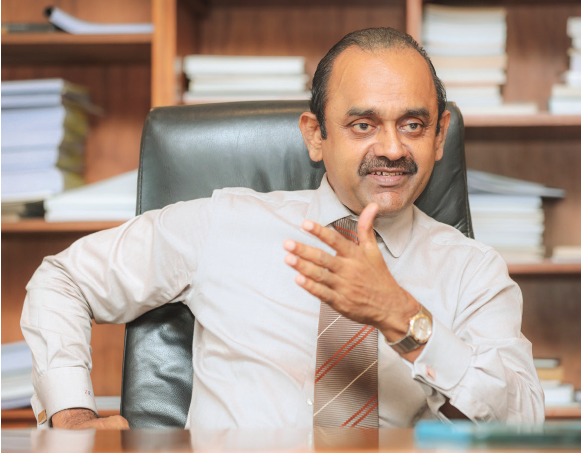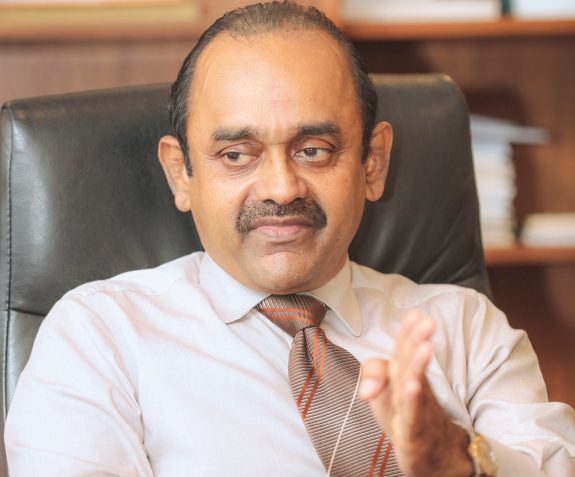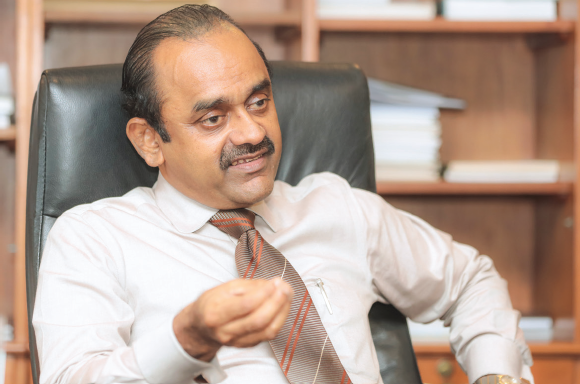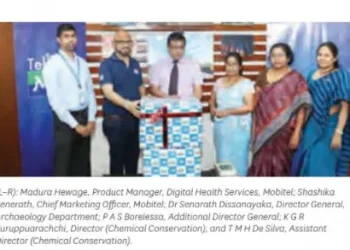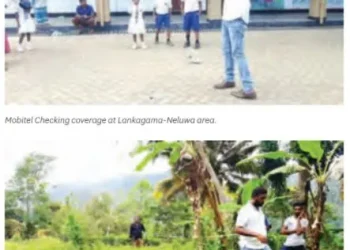Sujeewa Rajapakse, Chairman, People’s Bank has immense experience in the financial sector. Thus, the manner in which he looks at the operational aspect of People’s Bank is different. He emphasizes that the country should come first where all work towards economic development during the ‘new normal’. The Chairman states that there are many opportunities and the country should be positive as we have a stable Government and a President with a clear vision. People’s Bank has always been the Bank of the People, and in this era it continues to focus on supporting small, medium and micro level customers, and also agriculture and other industries to ensure that the Bank is a true partner in economic development.
By Udeshi Amarasinghe. | Photography Menaka Aravinda.
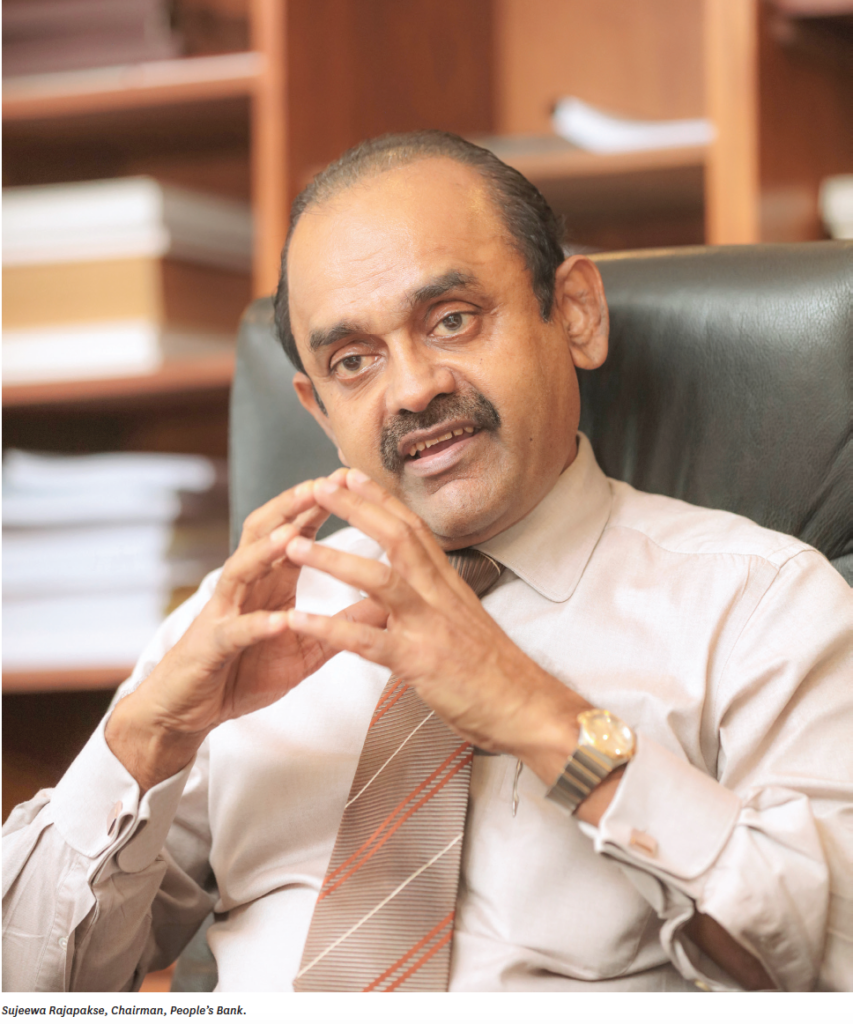
Can you speak about your appointment as the Chairman of People’s Bank?
There was a selection process for the appointment of Chairpersons and Board of Directors of state institutions and public enterprises. One of my personal aims has been to become a Chairman of a bank because my background is in finance. Why People’s Bank? I was asked to take over another state owned bank but then later I thought I need to look at a bank, which reaches the mass market and SMEs in this country. People’s Bank as the bank of the people mainly caters to SME and micro level customers. If you take 22 million people, we have over 11 million customers with us and 15 million account holders. Therefore, I thought the best thing for me is to look at People’s Bank and take this institution to a different level.
People’s Bank as of today ranks at number four, we have been at even higher positions previously but it has gone down due to certain reasons. I believe that the responsibility and duty of a banker is not only to look at the top-line or bottom line. There are greater duties that you need to perform as a banker, especially when comparing between the state-owned banks and the private banks.
Private banks of course, I have also been a board member of a private bank and, motive is mainly bottom line and top-line growth as well as increasing the wealth. But when you take a state-owned bank that is not the main objective. There are various other objectives including assisting the Government to implement their policies through these banks. I consider myself as patriotic and I wanted to do my duty to the country, the people and the economy and assist the Government by being the Chairman of People’s Bank.
His Excellency’s manifesto, which has now become the manifesto of the country. The focus is on developing the agricultural sector and many other industries.
As soon as I took over this position I understood that the Bank had been managed somewhat similar to a cooperative culture as well. We have 7,500 staff members who are very committed to the development of this Bank. We have 750 branches and service centers through which we reach the entire customer base in the island. I understood that there were many areas that needed to be developed at People’s Bank. I looked at the balance sheet and being a very senior financial professional and consultant was able to determine the total picture. I rallied my finance team and operations team and we changed our direction to focus on certain important areas. In March, COVID-19 hit Sri Lanka and the lockdown was imposed. As a result, the banking industry became indispensable because everyone required hard cash, or liquidity. We had to curtail some of the plans we intended to implement because we were basically busy in day to day operations, making sure that our customers and the Government, which is our major stakeholder are comfortable. We understood about the importance of assisting and reaching out to the people of this country. We always respect the corporate sector, but more than the corporate sector, we wish to focus on the SME and micro sectors. To cater to these segments, we introduced a number of loan offerings.
All stakeholders including the customers and the Government are happy with our approach. We should always keep in mind His Excellency’s manifesto, which has now become the manifesto of the country. The focus is on developing the agricultural sector and many other industries. Therefore, to be in line with those requirements we have introduced many loan products.
The President also stressed on single digit interest rates and to reduce inflation while focusing on six to 6.5 percent economic growth. We may not be able to achieve that growth this year but going forward it will happen. We can assist with achieving those targets. During the past couple of months, we introduced loan products with single digit interest rates. Such measures will continue with the same momentum.
The President also stressed on single digit interest rates and to reduce inflation while focusing on six to 6.5 percent economic growth.
Considering that the President has a clear direction, how will the Bank support national development?
That is very important for us. We must understand that with the COVID-19 situation many positive aspects came in as well. One is that the Government had to restrict imports. As of today, you cannot import vehicles, vehicle spare parts, plastic or import any non-essential items. Therefore, we need to seek alternatives because the country has become used to certain patterns.
Therefore, the Government restricted imports but also stressed the need to focus on import substitution as well. For example, if we do not have turmeric or pepper in the market then we have to immediately grow them. At the new Cabinet swearing in ceremony, the President and Prime Minister introduced new types of ministries, which was the first time in the history of the country. People started looking at these ministries differently. They took it as something unusual.
Ministers were not that happy, but later people realized that those are areas that need to be developed. These also could be considered as cottage industries. Development can be taken to the village level through such industries. Therefore, at People’s Bank, we recently launched a loan portfolio with the tagline ‘Made in Sri Lanka’ because we expect customers, and the citizens of this country to purchase products that are ‘Made in Sri Lanka’.
The President also stressed on single digit interest rates and to reduce inflation while focusing on six to 6.5 percent economic growth.
The import restrictions enabled the country reconcile its balance of payments. This also enabled the dollar exchange rate to be kept at a minimum level. It is of course a bitter sweet experience. Some people like it and others don’t. But we are gradually starting to see the results. When you have a single digit interest regime, of course the cost of material will be less. Therefore, the cost of production will be less. Cost of service will be very much less and very competitive. This aspect is extremely important because we are an export oriented country and we are competing with all the other neighboring countries, where their interest rates have been very less, sometimes less than even five percent or some are at zero percent. Sri Lankan exporters, producers, and manufacturers will be able to make use of this opportunity and offer their services or production at a very competitive rate. We will be able to capture the export market in a substantial manner. Even within Sri Lanka the benefits of these reductions should be passed down to the end consumer. We are yet to see this happen. The prices of commodities have not reduced to the extent that they should. Bankers have also compromised their top-line and bottom line to purely be in line with His Excellency’s vision and to provide much affordable rates. There will be a spiral kind of impact that we will have to look at. But I hope that everyone will look at this positively, and will support the ‘Saubagyaye Dekma’ (Vistas of Splendor).
During the last few months, the Government released 150 billion rupees to the economy through the banking system for working capital requirement at the interest rate four percent. First 50 billion rupees, and then 100 billion rupees, where the entire sum is to be given as loans to the local industries. Bankers have taken up this opportunity because the loans are given at four percent interest. While some banks have focused on giving large loans. At People’s Bank, we have focused on the number of customers that we can assist. In that sense looking at the number of customers we are almost at the top. In value we may not be at the top. That shows we are dealing with a fairly large number of customers irrespective of the value. This reflects our focus on small, medium and micro level customers. But that does not mean we do not have large customers, we do have corporate customers as well. We are not only focusing on one industry we are looking at many industries across the board specially focusing on agriculture, and import substitution.
The Central Bank also reduced the statutory reserve ratio from six percent to two percent to make the economy more liquid and as a result we have been able to provide more financial benefits to the customers. At the moment there is a good amount of money available in our coffer because the Bank is fairly liquid. Therefore, we are in the process of formulating our loan and advance policies because we need to make sure that we fall in line with the President’s development program.
As one of the largest banks or state owned banks, we have been assisting the Government and state-owned enterprises on a very large scale.
How is the Bank supporting the agricultural and industrial sectors?
Predominantly People’s Bank has been supporting the agricultural sector on a fairly large-scale. But you need to understand that more than two million people are engaged in agriculture but the sector’s contribution to the economy is only seven to eight percent to GDP, which is not substantial. By keeping that in our mind, we have introduced a new product named ‘Aswanna’, which is embraced by most of the small and medium scale businesses who are into agri, livestock and fisheries. We have provided about a billion rupees’ worth of loans to over 2,000 customers. These are not large-scale but small and medium, where each loan would be up to five million rupees. If they want to purchase equipment or acquire a land on a relatively small scale, they have to do so within the five-million-rupee loan. The President’s vision is to produce more entrepreneurs in this country.
It is not just a businessman but an entrepreneur. When there are entrepreneurs there is a massive impact to the country and the economy at large because you create employment, and infrastructure. People’s Bank has to ensure that we create a number of entrepreneurs. We do not expect people who are especially outstation to come to Colombo. We expect them to be in their own areas and start their own businesses. We have so far been successful in this endeavor.
The Central Bank also reduced the statutory reserve ratio from six percent to two percent to make the economy more liquid and as a result we have been able to provide more financial benefits to the customers.
How is the Bank geared to support customers in this new normal?
People’s Bank has been probably number one in providing facilities to the customers in this country during the lockdown period. 460,000 customers were benefited; that is People’s Bank and People’s Leasing and Finance PLC where I am the Chairman as well. Even we understood that when the lockdown was imposed, people needed liquidity because we were just confined to our homes. We made sure that we immediately mobilized our ATM and CDM mobile vehicles. Through that we made sure that all household benefited because they were able to withdraw their cash. People’s Bank is also rated as number one in our digital platforms. We have new and effective digital platforms, where customers can log in and do their transactions and transfers. When the Government announced the moratorium to extend the loan payments, credit card and other commitments by a number of months, within three days’ time we were able to change our complex computer systems to accommodate the needs of the customers. Having done that through our systems, there were many loan payments deducted but we immediately reversed such deductions. That is the way we made sure that our customers benefited. In the meantime, People’s Bank is one of the few banks that opened about 75 percent of our branches throughout the period of COVID-19. You may remember when the Government wanted to pay various payments we volunteered. Even during the weekend through our network of committed staff we made the Samurdhi and other such payments, which was mainly done by People’s Bank.
Even recently, there were three failed finance companies, Swarnamahal, The Finance and ETI. All payments were done through People’s Bank, where we undertook to pay 600,000 rupees’ maximum to each depositor through the Depositor Insurance Scheme from the Central Bank. We did this without any difficulty. As a result, everyone was very happy and comfortable. That is the kind of service and social responsibilities that we have undertaken. People’s Bank also took a lead role in introducing new loan schemes or products. As a result, other banks also followed.
We have a couple of trillion rupee balance sheet. People may feel when we give such large amounts of concessions, what is going to happen to the Bank. The Bank is on a very strong footing, there is no question about that sustainability. We understand that there will be some drawbacks in the short-run such as for the next two years. The Government and the Bank strongly believe that what we require at this moment is country’s balance sheet to be strong. We should not only look at our own balance sheets because we need to help the economy and country at large. If you take the top-line and bottom line, we understand that even our results for the last quarter, which was published, there is a drawback but we know that it is only temporary. Because we have adjusted the ‘Day One’ loss, Day One loss is when you provide moratoriums. People’s Bank is one of the very few banks that provided this loss from day one. We will perform and catch up the losses in the next few years. It is also noteworthy to record that as a state-owned bank, if there is a significant amount in the bottom line that sum would be transferred to consolidated funds by way of dividends. But in our case, the Government is not worried about the bottom line specially this year.
They said to give the maximum benefits to our customers to resurrect the economy. But when it comes to private banks, I believe that they also may have different priorities. That is how we look at it.
In our case, the Government is not worried about the bottom line specially this year. They said to give the maximum benefits to our customers to resurrect the economy.
People’s Bank though a state-owned bank has a very customer centric approach. Can you elaborate on that?
The tone at the top is very important. I have focused on our service being customer centric. We have deviated from the conventional type of banking. Typical banking is where you go and deposit money, take a loan and they charge an interest or some process similar to that. At People’s Bank, we are completely changing our outlook. I have a very good General Manager and the team. We have excellent board members who understand the whole phenomena. We are changing because at the end of the day, it is the customer and other stakeholders who matters for us. Therefore, we at People’s Bank wear different hats; there is the customer and bank relationship, we are a friend to the customer, a counsellor, and a consultant to the customer.
I have explained to my staff, if there is ever an issue, especially for example non-payment of loans because we are working with depositors’ money. Therefore, we have to ensure that the money we have given to the customers by way of loans are recovered. I have asked my staff not to wait till the last moment but to meet with the customer and discuss their situation and advice them. That is how we are becoming more customer centric. Our main focus is the development of soft skills and interpersonal skills. That is my forte. I want to make People’s Bank a very pleasant environment for the customers. We have also created the position of relationship manager. Every branch must have a relationship manager. It is not a designated position but a relationship manager will be appointed daily to look after the customers. Customers come to the bank for various reasons and they must be able to resolve their issues at the bank itself. There is a major paradigm shift happening, which will definitely help us to take this Bank from number four position to number one. I have explained to my staff that we will become the number one bank in the country one day. Our main motive is not profit or top-line but to serve the country and to take the President’s vision forward.
Today, the banks and the Government are working closely with the Prime Minister as Finance Minister and the Former Governor of the Central Bank, Ajith Nivard Cabraal being the State Minister. Can you elaborate on this experience?
I am extremely happy to see one of our senior Chartered Accountants, former President of the Institute of Chartered Accountants, and the former Governor of the Central Bank, Mr Ajith Nivard Cabraal being the State Minister of Money & Capital Markets and State Enterprise Reform, with the Prime Minister as the Finance Minister. Mr Cabraal is a practical man, he understands all the economic fundamentals and he has done an immense amount of work during his nine-year tenure as the Governor.
I was also involved in one of the committees for about three to four years. Thus, I have experienced the manner in which he works, all the economic fundamentals will be in place in this country. Fortunately, we also have Dr P B Jayasundera as the President’s Secretary, he is a visionary in terms of economic policy. This combination is absolutely important to me. I am confident that Prime Minister also must be extremely happy about having such committed personality with him. The President’s manifesto, which is the Government’s manifesto focuses on ten important areas, which will enable that two years down the line everything will be in place. There is a focus in reducing inflation, reducing unemployment and increasing per capita income, single digit rate of interest, and stable exchange rate. I am very happy and I am positive. More than anything, we have a very strong Government. A two-thirds majority Government and there will be consistent economic policies, and fiscal policies. Previously every other day there were changes in policy. That will not happen. There are quite a number of inquiries from overseas especially foreigners who want to come and setup their investments in Sri Lanka. That is another positive that we see. Going forward we will all be happy, the drawbacks we are experiencing today are due to COVID-19, which is beyond our control and it is a global pandemic. But going forward, the Government will take this country to the next level.
How is the Bank working together with the Presidential Task Force on Economic Revival and Poverty Eradication?
I take part in certain meetings chaired by the President, where ministers, ministry officials and other relevant industry officials are gathered to discuss the various work that we do. Mr Basil Rajapaksa’s knowledge in each and every area and ministry is unbelievable. He has everything at his fingertips. When other people speak about certain issues, he goes back to the particular area and town and gives an accurate account of the situation. No one can bluff him because he is a maestro in the game. I experienced this even as recently as the past three to four weeks. He doesn’t bring a single piece of paper; he speaks off the cuff. I participated in many discussions during the COVID-19 lockdown, and he looked at every single aspect and ensured that it was looked after for the betterment of the people. His Excellency has very interactive sessions with all the stakeholders in each Ministry. I have noted that his message to everyone is very clear to work hard to accomplish the given task. Mr Basil Rajapakse also gives all solutions then and there. That is the type of leader we should surely have and hopefully he will someday get into active politics. He is a blessing to the Government, the President and the Prime Minister as well.
You have experience in the private sector. Even currently you can see that some of the private banks are looking at the escape route and more concerned about safeguarding shareholders’ interests without looking at the government policies. Your views?
There is a clash between the expectations of the shareholders and the Government’s direction. In most of the private banks, the Government has 30-35 percent shareholding. At this moment, I believe private bank shareholders have to seriously look at the good of the industry and the economy at large. Lending has to be done at a competitive rate. But I would like to say in fairness to them I have seen in the recent past some banks having introduced very good loan products. When People’s Bank introduced good products they too fell in line and the private banks introduced their loan products. Bank employees and the board will have to strike a balance between the service to the customers, and return to their shareholders. These are two different areas. I believe that in the next couple of years, they will need to seriously look at how best they can change their mindset to help the Government and the economy at large.
More than anything, we have a very strong Government. A two-thirds majority Government and there will be consistent economic policies, and fiscal policies.
Can you speak about the staff at People’s Bank? In some areas it is only the state banks that are present. How do you motivate the staff?
It is not a financial motivation alone. We have employed a number of young people including Millennials as well as those from Gen Z in our 7,500 strong cadre. They would like to see some kind of recognition. They need to know why do they do certain things. I used to invite business leaders to address the senior staff. I could not do that for the others but I always address them. Wherever I go I address them and explain to them that while it is important to know the hard skills and have knowledge on banking that it is essential for them to develop soft skills and interpersonal skills. The manner in which they articulate themselves, the way they allocate time, and how to look at the issue from the customer’s perspective, emotional intelligence, and stress management, all come under soft skills and the interpersonal skills. Together with the GM and the team, I continuously educate our staff on the importance of soft skills and interpersonal skills. It is very important for them to understand the customer and to treat them properly. That is why People’s Bank is deviating from the conventional type of banking. The tone at the top is important, when I address them they realize the importance of what I say. I explain my staff that if we cannot discharge our duties properly then we become irrelevant. Therefore, give it to someone who can be relevant. I give that message then and there.
I am not only sitting in this room at head office. I visit branches and meet my staff. I do not only visit the customer service area; I start from the back, and I check their washroom, dining room, every section and then I come and speak to them. They know that and they are very happy. I can claim that I may be one of the few chairmen who has visited his branch offices in this manner. I always believe it is important to motivate the staff for their hard work. But I also tell them that it is not only being a hard worker but they also need to be a smart worker.
I have to also work with the unions as they are a part of the work culture at People’s Bank. I always engage with them, I do not disregard them. They are an integral part of the whole system. They have submitted many good proposals to develop the business. When they know that the right person is at the top they do not mind engaging in a discussion. My principle in life is that I work for the institution, I do not work for people. I always work for the institution so then it is very easy. Then it is not myopic, you are not under obligation to anyone, you work for the institution so that you achieve the qualitative and quantitative aspects of the strategic plan. Once it is done you are happy.
What are the experiences that you will bring to this organization?
There are many customers that come to the Bank with so many issues. Because of my experience from different disciplines, I am not like a typical chairman. When I speak to the customer I can fathom, I can see and I can read their mind. When I look at their accounts I can understand the real situation. I am able to advice the customers and I also explain to my staff the areas they need to focus on such as the risk factors.
I have added value in the whole operation. The governance structure is very important especially for financial institutions. We wanted to issue certain debentures to be in compliance with BASEL III and we were able to collect 20 billion rupees in a couple of hours. That is a great testimony to say that People’s Bank has the best governance for customers to have confidence in us. To invest 20 billion rupees is something noteworthy to state. Likewise, people are very happy. All stakeholders including the Government is happy in my view, in the way we operate the business.
I always work for the institution so then it is very easy. Then it is not myopic, you are not under obligation to anyone, you work for the institution so that you achieve the qualitative and quantitative aspects of the strategic plan. Once it is done you are happy.
Can you tell us about yourself?
I am from Matara. I am a product of Richmond College, Galle. I am a southerner. It is always great to be a southerner. I am a tough character in terms of achieving results. My parents were from the village and they were primarily farmers while also being engaged in small business as well. My father was also with People’s Bank throughout his life. I realized later he had pride in saying I am with a state bank.
I am a Chartered Accountant by profession. I am a very senior Chartered Accountant. I started my career as a Raw Audit Trainee for a firm known as Burah Hathy & Co and I continued to work there. From Audit Trainee, I rose up the career ladder to become the managing partner of the organization. I have been there for the past 30 years, and I never worked for any other place, that was my employer and I finally became the employer as well. I have a fairly large number staff working at the firm.
Now this firm is called BDO Partners. I was the President of the Institute of Chartered Accountants. While working at the firm I wanted to obtain experiences in the industry. As a result, I was able to work as an independent non-executive director in few listed companies. Even at present, I am the Chairman of People’s Leasing, Deputy Chairman of Softlogic Life, board member of Haycarb and Dipped Products. There are many more companies that I am a board member. I am a council
member of the Sri Jayewardenepura University. I do it to give something back to the country. Other than that, I do a fairly large amount of charitable work. I have a passion for that. I am more a spiritual person and I am a Buddhist. I always focus on working for the people of this country.
Future of Sri Lanka?
In my case, I have never been negative because even stemming from this COVID-19 situation, there are many opportunities available. Many people are down-hearted and they are feeling negative. There is a great future; in the next five years, we can be sure of a strong government. That itself is a great testimony for us to say Sri Lanka is going to be there at a differently level in the next five years and beyond. We will certainly compete with all neighboring countries. There is focuses development in every part of the country. He wants to be totally committed to the development of this country. Not for personal gains. When a leader is speaking in that way, there is no reason why others should not fall in line as well. If you look two years down the line, there will be a major change in the economy.
Agriculture and industries are the two major areas of the economy. The leisure industry whether we like it or not is very sensitive. That is why the President asked the leisure sector to look at other avenues of revenue as well. In July, we had more than a billion dollars worth of exports, we saw the V-shaped economy, where it went down and then picked up again. We are yet to see the results of the month of August, but I am sure we have done well.
When the head of state is positive, there is no reason why we should not be positive. Going forward the country will prosper. With the FDI also coming into the country, we are going to do very well.
The entire country should be in line with the development agenda. That is important. Forget about your balance sheet and look at the country’s balance sheet, at least for the next two to three years. I am not talking about longterm. But for the time being, everyone needs to do their part.
Whether we like it or not the country has been fortunate and unfortunate. The country had to face a 30-year long conflict, which we should not forget and then we had to face certain issues due to the uncertainty of the Government, where the two leaders were not seeing eye to eye and as a result, we were behind Afghanistan when it came to economic development. Again, we had the April 21st attack in 2019 and then we had to face the COVID-19 pandemic this year. We have been waiting to see this country become another Singapore, for some reason we could not achieve that goal. The entire country should be in line with the development agenda. That is important. Forget about your balance sheet and look at the country’s balance sheet, at least for the next two to three years. I am not talking about long-term. But for the time being, everyone needs to do their part. The Government has given enough of opportunities and concessions, which are unbelievable. As a responsible Government they have done everything. Therefore, it is our responsibility to make use of the opportunities provided and take the country forward. I am very positive. We need to do the best for our country. Of course we must thank the Armed Forces, other Officials, Ministry of Health and Medical professionals who have been committed to the control of COVID-19, where Sri Lanka has controlled the situation, compared to the rest of the world. It is because of the visionary leader and the rest of the team. We need to ensure that we reach six to 6.5 percent economic growth in the next one or two years and the rest will follow.
